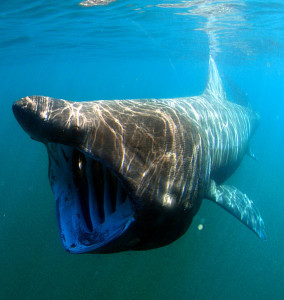Basking Shark Territory:
No Territory Map Yet!
Basking Shark Basic Facts:
Diet: Carnivore
Size: 40ft (10m)(avg)
Weight: 28,500lbs
Life Span: 50 Years (est)
Group Name: School or shoal
Speed: 2.5 MPH Typically
The Basking Shark (Cetorhinus maximus) is the second largest fish in all the world’s water. It is second to the whale shark. The size of an average mature basking shark is said to be at least 40ft (10m) long weighing about 19 tones (28,500 lb.). This gigantic creature feeds on planktons with its five big gill slits that are found round its head. It has an almost conical pointed snout with very large dorsal and pectoral fins.
Humans are the only creatures that claim to be social. However, this is also evident among the Basking Sharks. They are very social creatures too. Most of the time they would form sex-segregated schools of around 100. This social behavior is thought to follow the visual cues. Though their eyes are small, they are fully developed.
The habitat in which the basking sharks are commonly found is an environment that is characterized by cool and temperate waters. This is not the case everywhere. There has been a report that the basking sharks have also been found in tropical waters though they were very few in number.
The Basking Sharks are few in number due to their slow reproduction, they are more vulnerable to threats than most species. The basking shark species is hunted for its sweet meat and its liver oil is used for the manufacturing of cosmetics. Currently, the fish is being hunted for its fins which are later on taken to the Far East to make the shark fin soup. Due to these threats posed to the indigenous species, the basking shark has drastically reduced in number, reportedly having reduced by over 80 % since 1950s.
As a result of the threats, some organizations have been formed in the areas they are believed to be found to conserve the endangered species. For instance, in 2002, this species was allowed into appendix II of the convention on International Trade in Endangered Species (CITES) with the aim of reducing the international business in basking sharks.
